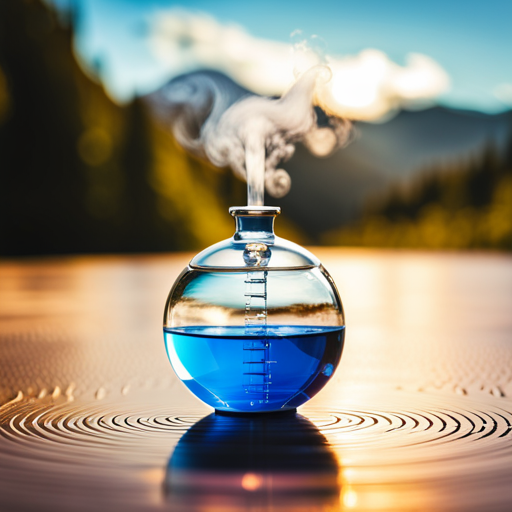Are you looking to maximize the efficiency of your humidifier and create a healthy home environment? Choosing the right water is a crucial aspect of achieving this goal. With so many water options available, it can be overwhelming to know which one to choose. But don’t worry, we’ve got you covered with the ultimate water guide for your humidifier.
In this guide, we’ll explore the pros and cons of different water options, including tap water, distilled water, and budget-friendly alternatives. We’ll also provide practical tips on how to make tap water safe for use and how to create distilled water at home.
By following these tips, you can save money, prolong the life of your humidifier, and ensure a healthy home environment. So, let’s dive in and discover how to maximize your humidifier with the right water.
Key Takeaways
– Distilled water is the best option for a humidifier to reduce mineral buildup, white dust emission, and prolong device lifespan.
– Tap water can lead to mineral buildup, white dust, and respiratory irritation, but filtering and boiling can help reduce impurities.
– Spring water can have varying mineral content, and reverse osmosis treated water is a high-quality alternative but requires an RO system or purchasing from a store.
– Regular cleaning and maintenance, as well as using demineralization cartridges or filters, are essential for a humidifier’s performance and longevity.
Water Options
You’ve got several water options for your humidifier, including tap water, spring water, distilled water, and reverse osmosis treated water, but choosing the right one is crucial for maintaining a healthy home environment and maximizing efficiency.
Tap water is the most budget-friendly option, but it can lead to mineral buildup, white dust emission, and potential respiratory irritation. Filtering tap water can help remove impurities and reduce mineral content, but boiling tap water isn’t as effective as using distilled or RO treated water.
Spring water can be a more affordable option compared to distilled water, but it may contain varying mineral content, which can lead to mineral buildup and white dust. It’s essential to research spring water sources and ensure that they’re free from impurities or contaminants.
Reverse osmosis treated water is a high-quality alternative to distilled water, but it requires an RO system for home use or purchasing from a store. RO systems can be expensive, but they provide high-quality water for your humidifier and other household needs.
Pros and Cons
Consider the advantages and disadvantages of using different types of water in your humidifier. Tap water may be the most budget-friendly option, but it can lead to mineral buildup, white dust emission, and potential respiratory irritation.
Spring water may be a more affordable option compared to distilled water, but it may contain varying mineral content, which can also lead to mineral buildup and white dust. Reverse osmosis treated water and distilled water are high-quality alternatives, but they may require an RO system or purchasing from a store.
One way to reduce mineral content in the water is by using demineralization cartridges or filters. These cartridges can help prevent mineral buildup, reduce white dust, and prolong the device’s lifespan. However, they require regular maintenance, and if not replaced on time, they can become a breeding ground for bacteria and mold.
Risks of using unfiltered water in humidifiers include mineral buildup, which can clog the device and reduce its efficiency, as well as the emission of white dust particles that can spread throughout the room and affect your health.
By considering the pros and cons of different water options and using demineralization cartridges, you can ensure a healthy home environment and prolong the life of your humidifier.
Maintenance and Cleaning
To ensure proper performance of your humidifier, regular maintenance and cleaning are essential. Over time, mineral buildup and bacteria can accumulate inside the device, affecting its efficiency and potentially causing health issues. To prevent these problems, it’s recommended to clean your humidifier at least once a week, or more frequently if you notice any signs of buildup or discoloration.
Cleaning tips for your humidifier include using a mixture of water and vinegar or a mild dish soap solution to wipe down the interior and exterior surfaces. Be sure to rinse thoroughly with clean water and dry completely before use. For hard-to-reach areas, a soft-bristled brush or cotton swab can be helpful.
Additionally, it’s important to replace the water daily and disinfect the device with a solution of hydrogen peroxide and water at least once a month. These preventative measures can help prolong the lifespan of your humidifier and maintain a healthy home environment.
DIY Distilled Water
Creating distilled water at home is a cost-effective and eco-friendly alternative to purchasing it from a store. With just a few simple tools and some patience, you can have high-quality water for your humidifier and other household needs. The water distillation process involves boiling water, capturing the steam, and condensing it back into liquid form. This process removes impurities and minerals, leaving you with pure, distilled water.
To help you understand the cost comparison between purchasing distilled water and making it at home, here’s a helpful table:
| Water Option | Cost per Gallon |
|---|---|
| Tap Water | $0.002 |
| Spring Water | $0.80 – $1.50 |
| Distilled Water (Store-bought) | $1.00 – $1.50 |
| DIY Distilled Water | $0.25 – $0.50 |
As you can see, creating your own distilled water can save you money in the long run. It’s also a more sustainable option since you’re not contributing to plastic waste from store-bought water bottles. With a little bit of effort, you can have high-quality water for your humidifier and other household needs.




